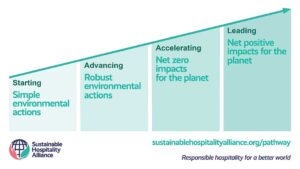The Sustainable Hospitality Alliance, which brings together hotel companies large and small to address key challenges affecting our planet and its people, has launched the Pathway to Net Positive Hospitality for the Planet, an online tool to help hotels around the world reach net-positive environmental goals.

The Pathway to Net Positive Hospitality for the Planet has four stages, and a majority of users start at stages 1 or 2.
“[The pathway] was a work in progress for the last nine months,” said Wolfgang M. Neumann, chair, Sustainable Hospitality Alliance, and founder, Neumann Hospitality. “[There’s been] a lot of talk about carbon neutrality, and we said, ‘Look, we need to be bold and really go beyond neutrality.’ Some [companies]in the hospitality industry haven’t done anything and don’t even know how to start. Others are quite advanced and are very innovative. So, we wanted to come up with a very clear, practical pathway which helps any hotel, brand or hotel company, regardless of size or affiliation.”
He added, “We’ve now launched this tool, which is really meant to be an inspiration for any hotel leader or any hotel company to do what we need to do. The last U.N. intergovernmental report from the scientists shows how urgent the situation is. We need to act.
The alliance itself is only 18 months old, but its roots go back 30 years as part of the International Tourism Partnership, which was part of the Prince of Wales initiative of Business in the Community.
“A year-and-a-half ago, we decided to launch the alliance as a freestanding U.K. charity representing about 30% of the global hospitality industry,” said Neumann. “Our name clearly says what we’re all about and that is collectively impacting hospitality, both from a people and planet perspective.”
The pathway is a free resource, available on the alliance’s website, “to help, inspire and guide the industry to get on this journey,” according to Neumann, who pointed out that there is also a financial plus to implementing sustainable business practices.
“The alliance, together with the World Bank, studied the business case for sustainable hospitality,” he said. “It shows that investing in sustainable business practices makes not only sense for the planet, but also for the [bottom line].”
There are four focal points along the pathway—climate, water, waste and biodiversity. “There’s a practical tool for carbon measurement to help [a hotel or company]take stock of how much carbon it produces, and how it can reduce it,” Neumann noted. “It’s the same way with water and waste. When you look at the tools embedded in the pathway, they’re practical, online in Excel spreadsheets and have been used by alliance members before, so there is traction and every little incremental step makes a difference.”
There are also four stages in the pathway. The first is for those hotels that haven’t done anything and don’t know where to start. “Their focus is really on energy, water and waste,” said Neumann. “The second one is about how they can advance and focuses on areas like water efficiencies and biodiversity impacts. Then, you start looking at the supply chain because it’s not just about the hotel; we need to look across the supply chain. So, it’s across the entire value chain that we need to look at it.”
A majority of those guided by the pathway will start at stage 1 or 2. The forthcoming stages 3 and 4 are much more complex, according to Neumann.
“There, we talk about the whole circular economy and touch on—from a biodiversity perspective—all the aspects which make a difference in our industry,” he said. “When you look at the sites where hotels are, we need to look at landfills. We need to look at the suppliers in a way where we hold them accountable, not just guiding them and helping them along the way but literally measuring them and taking actions”
Neumann pointed out that the pathway can be taken differently depending on what region a hotel or company is located.
How you do it in India is different from how you do it in Denmark, but that doesn’t mean that you cannot accelerate further in Denmark or have real traction also in India,” he said. “Plastic waste is more of a challenge in certain countries in Asia versus countries in Central Europe. That’s why the pathway is a principle guidance, and then you pick and choose from it and see how it works for you in your organization, locality and culture.”
The alliance represents about 30% of the global hospitality industry, including the big players like Hilton, Marriott and Accor, as well as midsize nd small companies.
“All of these companies have the common commitment to not just put the logo on the website and say we are members of the Sustainable Hotel Alliance, but to really actively engage with their peers,” said Neumann. “Sustainability is not about competition; it’s about collaboration.”


